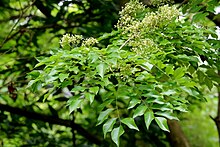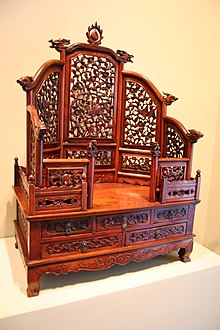Dalbergia odorifera
 From Wikipedia the free encyclopedia
From Wikipedia the free encyclopedia
| Dalbergia odorifera | |
|---|---|
 | |
| Scientific classification | |
| Kingdom: | Plantae |
| Clade: | Tracheophytes |
| Clade: | Angiosperms |
| Clade: | Eudicots |
| Clade: | Rosids |
| Order: | Fabales |
| Family: | Fabaceae |
| Subfamily: | Faboideae |
| Genus: | Dalbergia |
| Species: | D. odorifera |
| Binomial name | |
| Dalbergia odorifera T. Chen | |
| Synonyms[2] | |
| |
Dalbergia odorifera, fragrant rosewood or Chinese rosewood,[3] is a species of true rosewood in the genus Dalbergia. It is a small or medium-sized tree, 10–15 metres (33–49 ft) tall.[4] It is endemic to China and occurs in Fujian, Hainan, Zhejiang,[4] and Guangdong.[5]
Description
[edit]A deciduous tree, D. odorifera will start shedding leaves at around December of each year in the Northern Hemisphere. It becomes dormant throughout the winter months.
Threats
[edit]It was overexploited in the twentieth century and was classed as a vulnerable species in 1998.[1] This reached a level in the early twenty-first century where most trees of a size for commercial use had been cut down. As a consequence, other species of Dalbergia started to be exploited in its place.[6]
Uses
[edit]It is used as a wood product and in folk medicine.[3] This valuable wood was used in China for furniture from the late Ming and early Qing dynasties[5] and new furniture in the same styles are sought after as luxury and prestige items.[6]

Four compounds isolated from the root of this plant have been shown in a laboratory to have antioxidant properties.[7]
References
[edit]- ^ a b World Conservation Monitoring Centre (1998). "Dalbergia odorifera". IUCN Red List of Threatened Species. 1998: e.T32398A9698077. doi:10.2305/IUCN.UK.1998.RLTS.T32398A9698077.en. Retrieved 14 November 2021.
- ^ "The Plant List: A Working List of All Plant Species". Retrieved 11 December 2015.
- ^ a b "Dalbergia odorifera". Germplasm Resources Information Network. Agricultural Research Service, United States Department of Agriculture. Retrieved 21 January 2018.
- ^ a b Dezhao Chen; Dianxiang Zhang & Kai Larsen. "Dalbergia odorifera". Flora of China. Missouri Botanical Garden, St. Louis, MO & Harvard University Herbaria, Cambridge, MA. Retrieved 18 May 2012.
- ^ a b "The best Chinese furniture woods" (PDF). eastcornercompany.com. Archived from the original (PDF) on 2016-03-03. Retrieved 2011-08-09.
- ^ a b "Siamese Rosewood Dalbergia cochinchinensis". ICUN Red List. Retrieved 22 July 2022.
- ^ Yu, X.; Wang, W.; Yang, M. (2007). "Antioxidant activities of compounds isolated from Dalbergia odorifera T. Chen and their inhibition effects on the decrease of glutathione level of rat lens induced by UV irradiation". Food Chemistry. 104 (2): 715–720. doi:10.1016/j.foodchem.2006.10.081.
